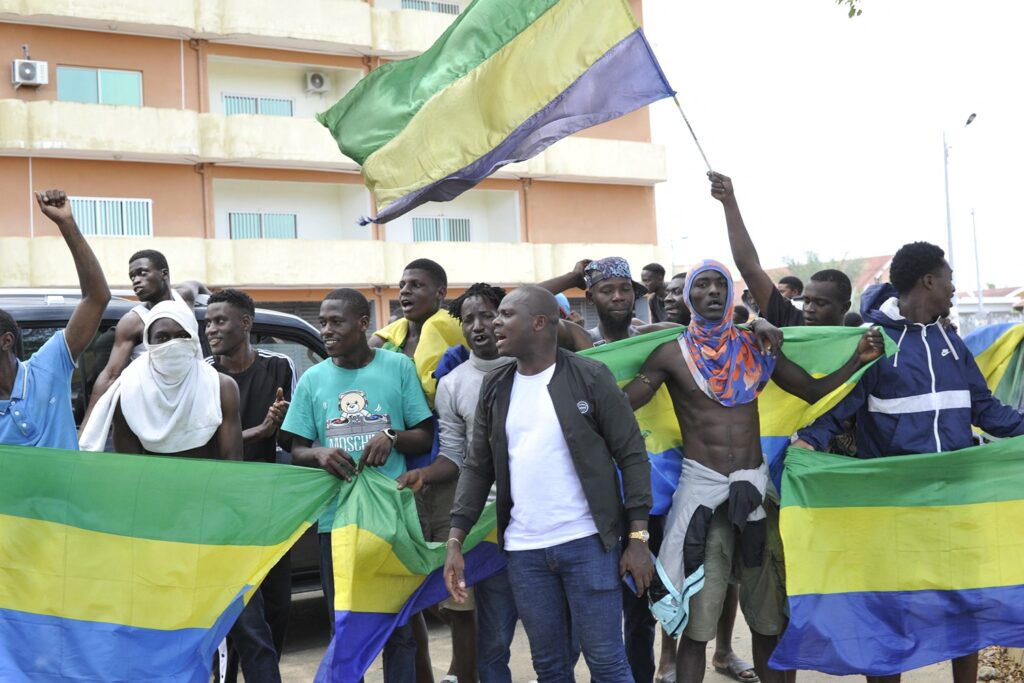Barely a month after Niger’s military toppled its president, Gabon’s army seized power, bringing to nine the number of military coups across sub-Saharan African since 2020. International sanctions have been imposed to try to nudge these countries back to democracy, with little success. With more of the region’s elected governments at risk of violent overthrow, French President Emmanuel Macron has warned that “all the presidents across the region are more or less aware of the fate that awaits them” unless democracy is restored.
1. What happened in Gabon?
Four days after the central African nation held disputed presidential elections that incumbent Ali Bongo was reported to have won, army officers appeared on state television to announce they’d canceled the Aug. 26 vote and dissolved the country’s institutions. Bongo first took office in 2009, succeeding his late father, who had held power since 1967. While the oil producer hasn’t had to deal with the jihadist attacks or spreading insecurity that’s dogged much of West Africa, the ruling family’s grip on power has come under pressure in recent years. Soldiers already launched a failed coup in 2019, months after Bongo suffered a stroke that sidelined him for several months.
2. And in Niger?
General Abdourahamane Tiani, the head of Niger’s presidential guard, appeared on state television on July 28 to name himself leader two days after his soldiers said they had detained President Mohamed Bazoum. The head of the army backed the coup, saying he wanted to avoid bloodshed. The coup there created a belt of military-run countries stretching from the Atlantic Ocean to the Red Sea — most of which are more closely aligned to Russia than to the West. The Economic Community of West African States, a 15-nation regional bloc, condemned the takeover and threatened to use force to restore the democratically elected leader, but hasn’t followed through. The country has been a linchpin in the fight by Western and African forces against the spread of Islamist militancy across the Sahel region. The US has a military drone base in the country, which it used to target insurgents affiliated with al-Qaeda and Islamic State in cooperation with the French military. The European Union also saw Niger as an ally in its efforts to tackle illegal immigration from Africa, some of which passes northward through the country en route to the Mediterranean.
3. Why has West Africa been so prone to coups?
The events in Niger followed two coups each in neighboring Mali and Burkina Faso and another in nearby Guinea. The leader of Sudan in the eastern Sahel was overthrown in 2021, the same year Chad’s military replaced its late president with his son, an army general. All these takeovers have been rooted in economic malaise and weak governance that have fed frustration among civilians and — in West Africa in particular — the spread of extremist violence. However, despite claims by the new strongmen that they are tackling insecurity, the number of people killed in the Sahel region surged in the first half of the year.
4. What are the implications for the Sahel and the fight against terrorism?
The coups in Mali and Burkina Faso saw their governments replaced by juntas that are hostile to ex-colonial power France, which had led the fight against extremism in the region for a decade. Mali and Burkina Faso kicked out French troops and hired mercenaries from the Kremlin-linked Wagner Group. Niger has seen its role as the West’s most important regional ally grow as a result — but the new junta has severed its security ties with France. The allegiances of Gabon’s new leaders remain unclear.
5. What are the economic stakes?
Gabon, which rejoined OPEC in 2016 after a 21-year hiatus, pumps about 200,000 barrels of crude a day. Global oil markets are unlikely to be substantively affected if its production is interrupted because it is a relatively small producer. More important is its role in the production of manganese, used to produce some of the hardest forms of steel. Niger is Africa’s second-biggest uranium producer, and exports most of its output to France, according to the World Nuclear Association. It produced 2,020 tons of the metal last year. Most countries that have suffered military coups in the region in recent years haven’t seen major disruption to mining operations despite the changes in power.
© Bloomberg
